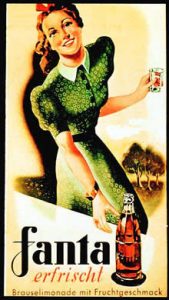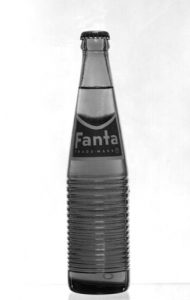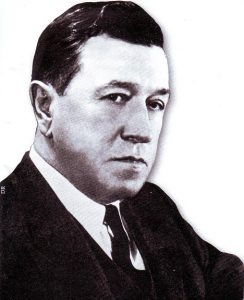IN SPITE OF NOT BECAUSE OF …

Today Coca Cola is undoubtedly one of the world’s greatest brands, not only present, but successful in hundreds of countries. It wasn’t however always like that.
Up until the late 1930s, Coca-Cola’s only real international success was in Germany where sales records were being set and beaten year after year. By 1939, Coca-Cola had 43 bottling plants and more than 600 local distributors there but storm clouds and even worse Stormtroopers were massing.
A trade embargo was imposed which put a halt to the supply of the key ingredients necessary for the production of Coca-Cola syrup.
To potentially further complicate things the man who had been in charge of Coca-Cola’s operations in Germany, American-born Ray Powers, died of injuries received in an automobile accident in 1938.
German-born Max Keith, took over. He was committed to trying to keep production going and keeping people employed. He decided to create to try and create a new product but knew that would only get access to what he later called the “leftovers of leftovers”.
Using whey and apple pomace – the skins, pulp, seeds, and stems of fruit that had already been pressed – he and his team created a a light-colored drink that resembled ginger ale.
 The new product needed a name and so Keith called together some employees for a competition. He told them to let their Fantasie [Geman for fantasy] run wild. Upon hearing that, veteran salesman Joe Knipp immediately suggested “Fanta”.
The new product needed a name and so Keith called together some employees for a competition. He told them to let their Fantasie [Geman for fantasy] run wild. Upon hearing that, veteran salesman Joe Knipp immediately suggested “Fanta”.
Fanta was a success despite its flavour varying depending on what fruits and other leftovers were available. In its earliest incarnations, the drink was sweetened with saccharin, but by 1941 Keith and is team were allowed to use 3.5% beet sugar in their recipes. In 1943, 3 million cases of Fanta were sold enough to keep the plants operating and Coca-Cola people employed.
While all this was happening executives at Coca-Cola in Atlanta did not know if Keith was still working for the company or for the Nazis. Communication with him was of course impossible.
 After the war though an investigator commissioned by Coca-Cola examined Max Keith’s actions and they were delighted to hear that Keith had not only never been a Nazi, he’d repeatedly rebuffed pressure to become one, suffered hardships because of those refusals. He had also resisted the temptation of selling Fanta under his own name.
After the war though an investigator commissioned by Coca-Cola examined Max Keith’s actions and they were delighted to hear that Keith had not only never been a Nazi, he’d repeatedly rebuffed pressure to become one, suffered hardships because of those refusals. He had also resisted the temptation of selling Fanta under his own name.
It is now recognised that it was thanks largely to Keith’s efforts that Coca-Cola was able to re-establish production in Germany almost immediately after World War II.
As for Fanta it was discontinued but as competition in new flavours increased in the 1950s, it was relaunched in 1955. Nowadays, while Orange is the main variety, there are more than 100 flavours worldwide.
And the moral is innovation is sometimes driven by necessity not desire. What challenges are you facing which could inspire your next innovation?